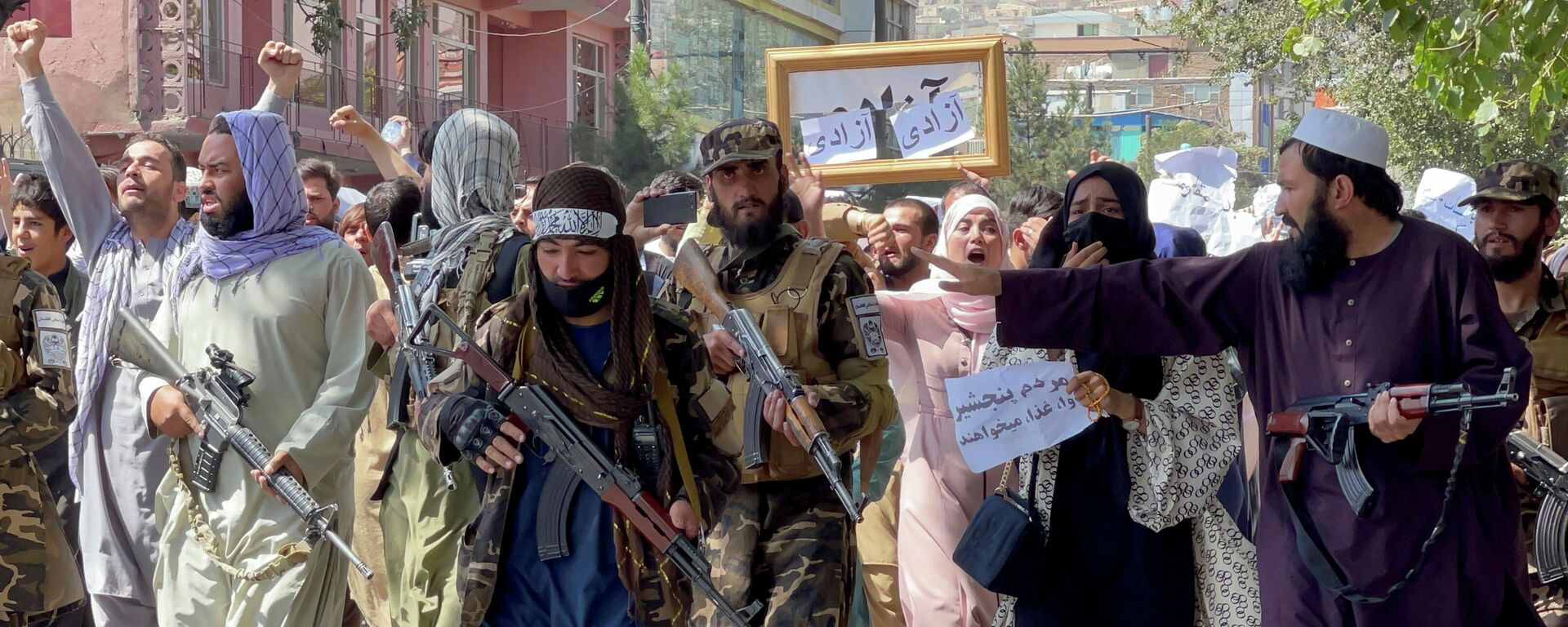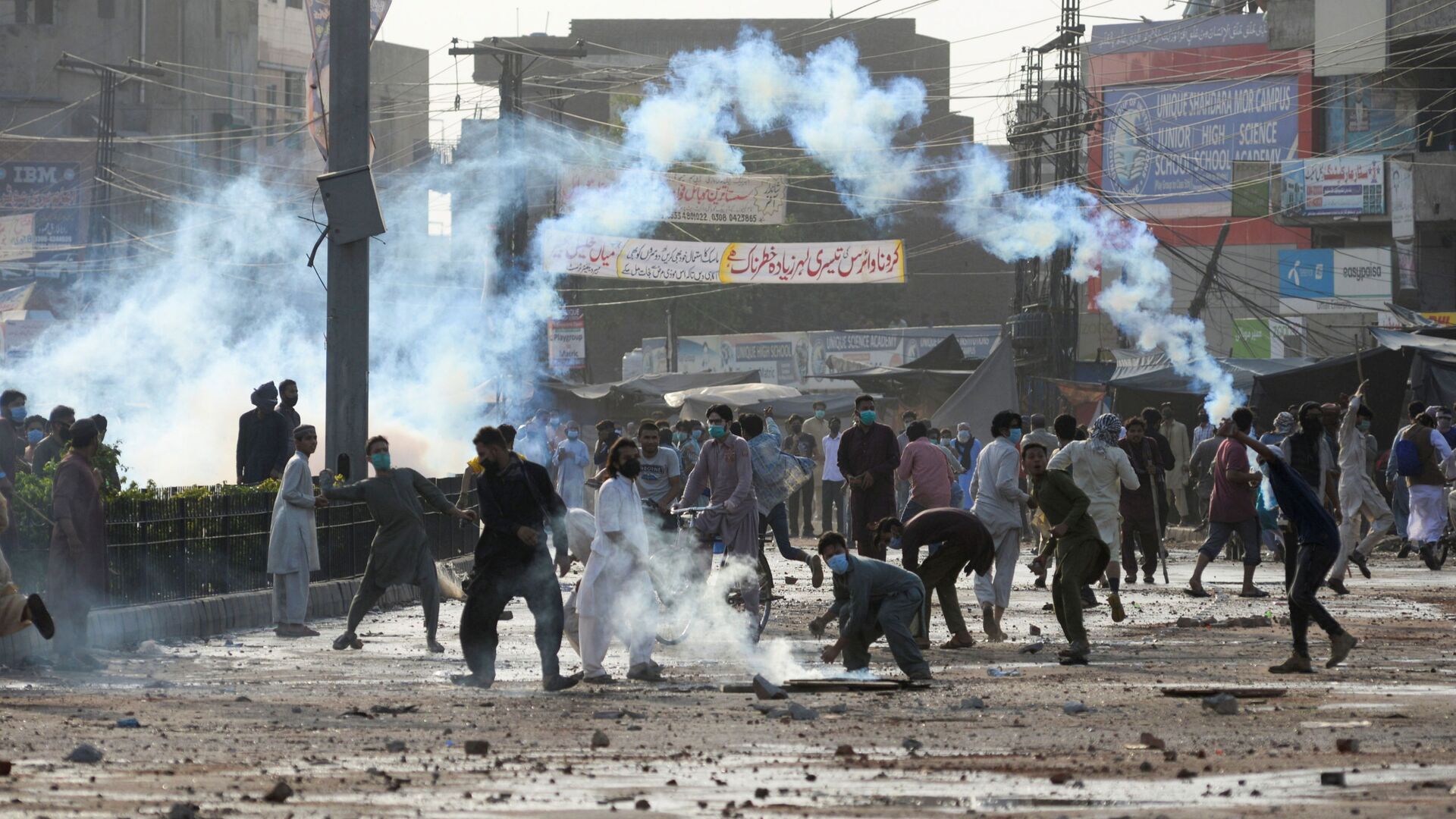https://sputnikglobe.com/20211105/talibans-interior-minister-reportedly-brokers-temporary-peace-deal-between-pakistan-and-ttp-1090494648.html
Taliban's Interior Minister Reportedly Brokers Temporary Peace Deal Between Pakistan and TTP
Taliban's Interior Minister Reportedly Brokers Temporary Peace Deal Between Pakistan and TTP
Sputnik International
The Tehreek-e-Taliban Pakistan (TTP), an offshoot of the Afghan Taliban*, says it wants to overthrow the Pakistani government and establish Islamic law in the... 05.11.2021, Sputnik International
2021-11-05T11:20+0000
2021-11-05T11:20+0000
2022-10-19T18:35+0000
afghanistan
pakistan
tehrik-i-taliban pakistan (ttp)
afghanistan
haqqani
asia
https://cdn1.img.sputnikglobe.com/img/07e5/04/14/1082677527_0:157:3080:1890_1920x0_80_0_0_be46cae9c3da9167ccbf4fbfbfda93e3.jpg
Taliban Interior Minister Sirajuddin Haqqani, a US-designated “global terrorist”, has brokered a “tentative” truce between Islamabad and the Tehreek-e-Taliban Pakistan (TTP), Dawn reported on Friday.The publication quoted Pakistani officials as saying that “direct, face-to-face talks” between the two sides had been taking place in Afghanistan’s Khost Province for the last two weeks.Islamabad has agreed to release up to a dozen junior TTP fighters under its custody as part of the deal.The temporary truce will be “extendable”, subject to how it plays out, say officials. All factions of the TTP are being covered under the ongoing discussions, Pakistani officials told the publication.The news report comes more than a month after the TTP announced a ceasefire with the Pakistani security forces in the South Waziristan district of the Khyber Pakhtunkhwa province. The region is one of the hotbeds of TTP militancy in Pakistan.In an interview with Turkish broadcaster TRT World on 1 October, Pakistani Prime Minister Imran Khan disclosed that his government was in talks with “some” of the TTP factions.Prime Minister Khan’s disclosure in the interview attracted criticism from Pakistan’s political opposition, with the Pakistan People’s Party (PPP) accusing the federal government of “rubbing salt in the wounds” of those affected by terrorism and not taking the parliament into confidence before granting “amnesty” to the TTP.The TTP was designated as a “banned terrorist organisation” by the US State Department in 2010. According to a United Nations Security Council (UNSC) report this year, the group is led by Noor Wali Mehsud and supported the Afghan Taliban in “military operations” against the Afghan National Security Forces (ANSF) during the US occupation of Afghanistan.While its base is in Afghanistan’s Nangarhar province, its main theatre of operation has been Pakistan. Many of its fighters are drawn from the tribal areas lying along the Pakistan-Afghanistan border in both nations.During a visit to Afghanistan on 21 October, Pakistani Foreign Minister Shah Mahmood Qureshi asked the Taliban’s interim Prime Minister Mullah Mohammad Hassan Akhund to not allow the TTP to use Afghan territory.TTP-Pakistan Truce a “Follow-up” of Doha Deal, Says ExpertKhalid Rahman, the chairman of Islamabad-based think tank Institute of Policy Studies (IPS), believes that the reported peace deal between the TTP and Imran Khan government is a “natural development” and could be considered as a “follow-up” of the Doha Deal of February 2020.He, however, adds with caution that the TTP is comprised “multiple layers” and the talks with the group must continue.Rahman also rejected criticism from the opposition parties centred on talks between the government and “terrorists”, arguing that negotiating peace with “indigenous” fighters was essential for the “political stability” and “economic development” of the country.*The Taliban is a terrorist organisation banned in Russia and many other nations.
https://sputnikglobe.com/20210917/pakistan-will-get-badly-burnt-if-it-courts-the-taliban-beyond-a-point-warns-author-1089151573.html
pakistan
afghanistan
Sputnik International
feedback@sputniknews.com
+74956456601
MIA „Rossiya Segodnya“
2021
News
en_EN
Sputnik International
feedback@sputniknews.com
+74956456601
MIA „Rossiya Segodnya“
Sputnik International
feedback@sputniknews.com
+74956456601
MIA „Rossiya Segodnya“
pakistan, tehrik-i-taliban pakistan (ttp), afghanistan, haqqani
pakistan, tehrik-i-taliban pakistan (ttp), afghanistan, haqqani
Taliban's Interior Minister Reportedly Brokers Temporary Peace Deal Between Pakistan and TTP
11:20 GMT 05.11.2021 (Updated: 18:35 GMT 19.10.2022) The Tehreek-e-Taliban Pakistan (TTP), an offshoot of the Afghan Taliban*, says it wants to overthrow the Pakistani government and establish Islamic law in the country. The TTP has been responsible for more than 1,800 attacks in Pakistan over the last decade, which have claimed the lives of over 50 Pakistani security personnel since August 2021.
Taliban Interior Minister
Sirajuddin Haqqani, a US-designated “global terrorist”, has brokered a “tentative” truce between Islamabad and the Tehreek-e-Taliban Pakistan (TTP), Dawn reported on Friday.
The publication quoted Pakistani officials as saying that “direct, face-to-face talks” between the two sides had been taking place in Afghanistan’s Khost Province for the last two weeks.
Islamabad has agreed to release up to a dozen junior TTP fighters under its custody as part of the deal.
“The truce will come into effect once the prisoners are released”, Dawn quoted Pakistani officials as saying.
The temporary truce will be “extendable”, subject to how it plays out, say officials. All factions of the TTP are being covered under the ongoing discussions, Pakistani officials told the publication.
The news report comes more than a month after the TTP announced a ceasefire with the Pakistani security forces in the South Waziristan district of the Khyber Pakhtunkhwa province. The region is one of the hotbeds of TTP militancy in Pakistan.
In an interview with Turkish broadcaster TRT World on 1 October,
Pakistani Prime Minister Imran Khan disclosed that his government was in talks with “some” of the TTP factions.
“I think some of the Pakistani Taliban groups actually want to talk to our government. You know, for some peace, for some reconciliation", Khan had stated.
Prime Minister Khan’s disclosure in the interview attracted criticism from Pakistan’s political opposition, with the Pakistan People’s Party (PPP) accusing the federal government of “rubbing salt in the wounds” of those affected by terrorism and not taking the parliament into confidence before granting “amnesty” to the TTP.
The TTP was designated as a “banned terrorist organisation” by the US State Department in 2010.
According to a United Nations Security Council (UNSC) report this year, the group is led by Noor Wali Mehsud and supported the Afghan Taliban in “military operations” against the Afghan National Security Forces (ANSF) during the US occupation of Afghanistan.

17 September 2021, 12:57 GMT
While its base is in Afghanistan’s Nangarhar province, its main theatre of operation has been Pakistan. Many of its fighters are drawn from the tribal areas lying along the Pakistan-Afghanistan border in both nations.
During a visit to Afghanistan on 21 October, Pakistani Foreign Minister
Shah Mahmood Qureshi asked the Taliban’s interim Prime Minister Mullah Mohammad Hassan Akhund to not allow the TTP to use Afghan territory.
TTP-Pakistan Truce a “Follow-up” of Doha Deal, Says Expert
Khalid Rahman, the chairman of Islamabad-based think tank Institute of Policy Studies (IPS), believes that the reported peace deal between the TTP and Imran Khan government is a “natural development” and could be considered as a “follow-up” of the Doha Deal of February 2020.
“The (Afghan) Taliban has agreed to end its support to all its terrorist allies and not allow the Afghan soil to be used by any outfit targeting foreign interests”, the Pakistani think tanker tells Sputnik.
He, however, adds with caution that the TTP is comprised “multiple layers” and the talks with the group must continue.
Rahman also rejected criticism from the opposition parties centred on talks between the government and “terrorists”, arguing that negotiating peace with “indigenous” fighters was essential for the “political stability” and “economic development” of the country.
“The government is not in as strong a position as it was three years ago when it had just swept to power. It has no other option but to negotiate with groups such as TTP”, the think tanker reckons.
*The Taliban is a terrorist organisation banned in Russia and many other nations.



